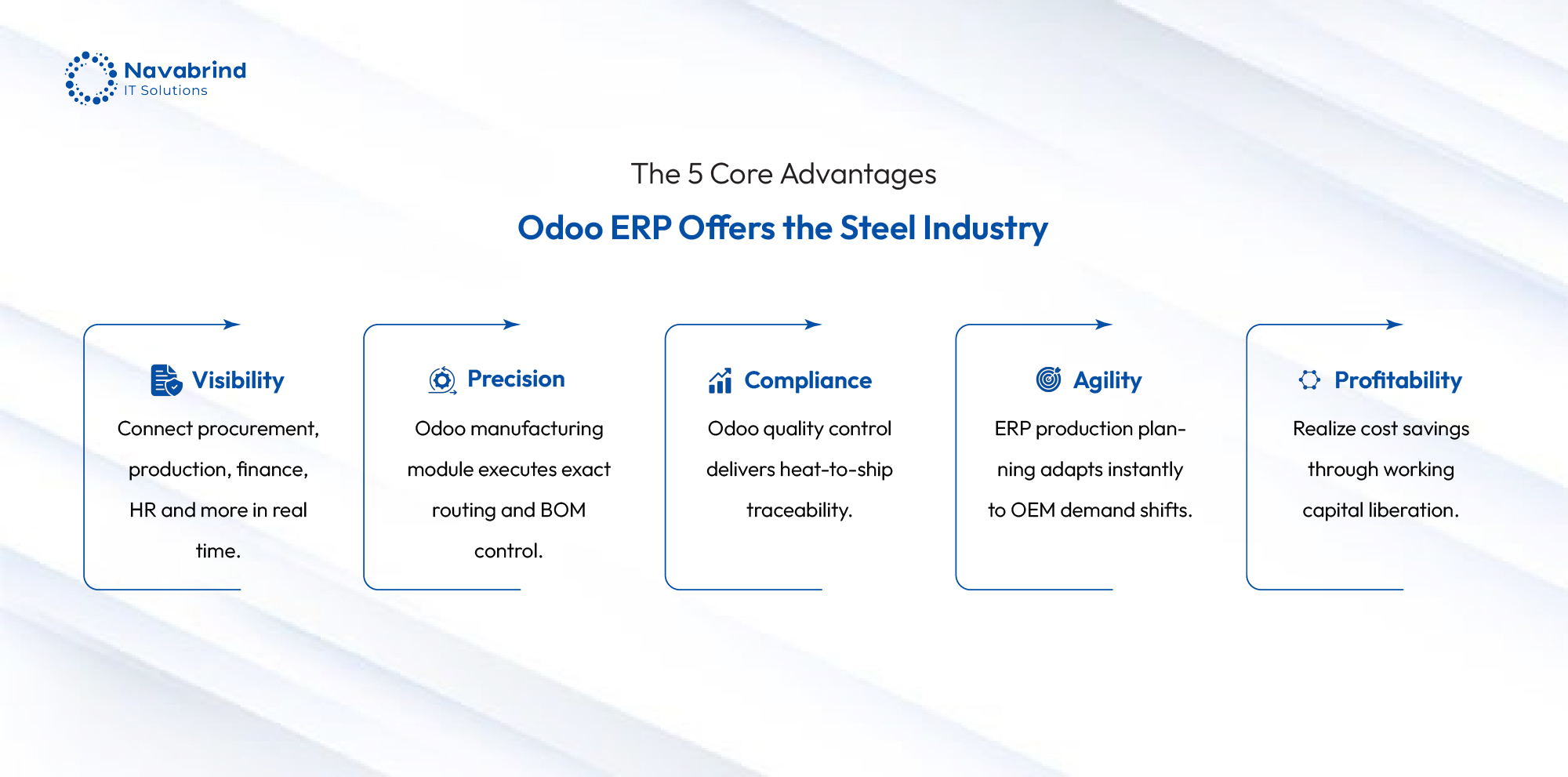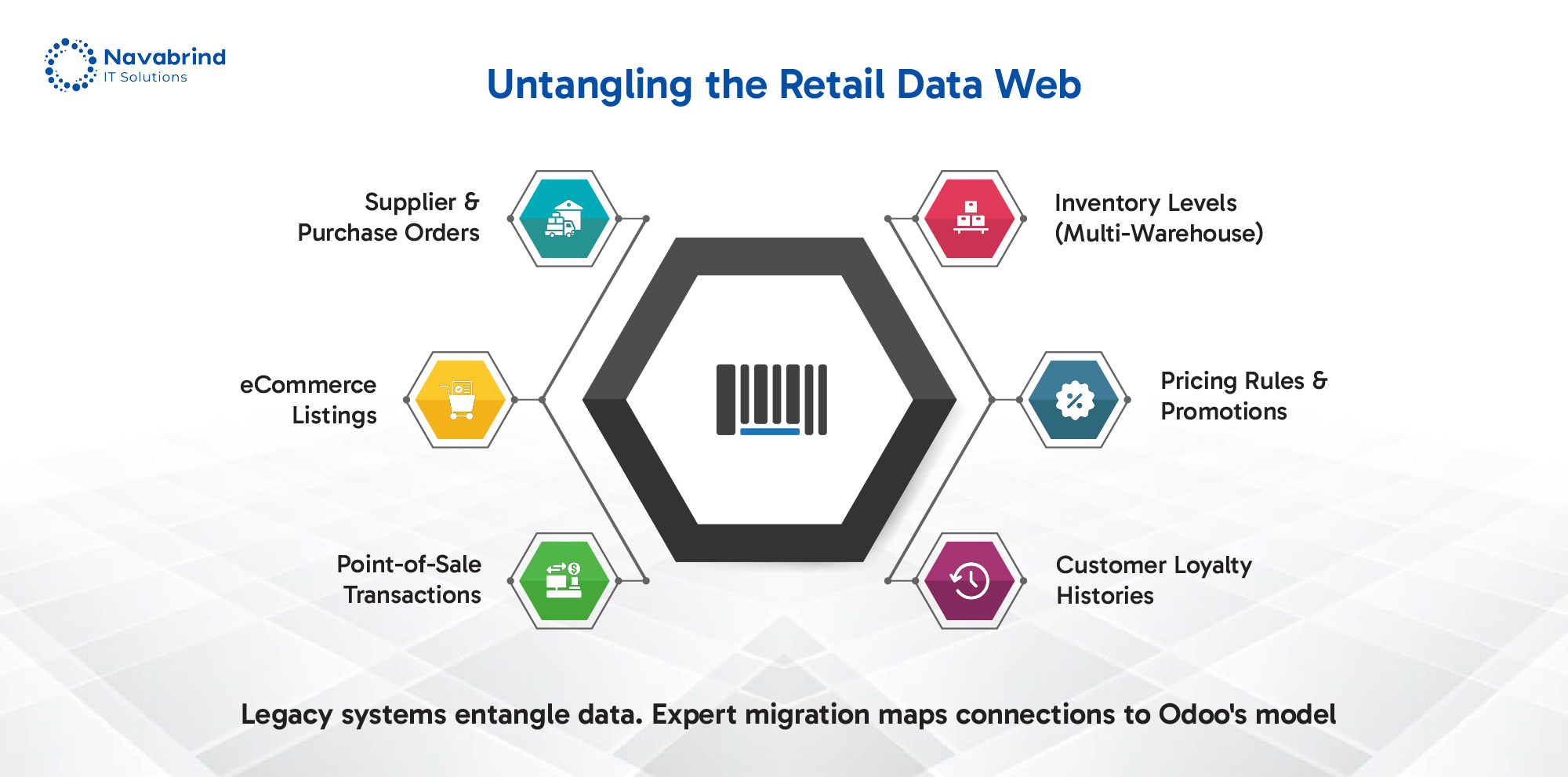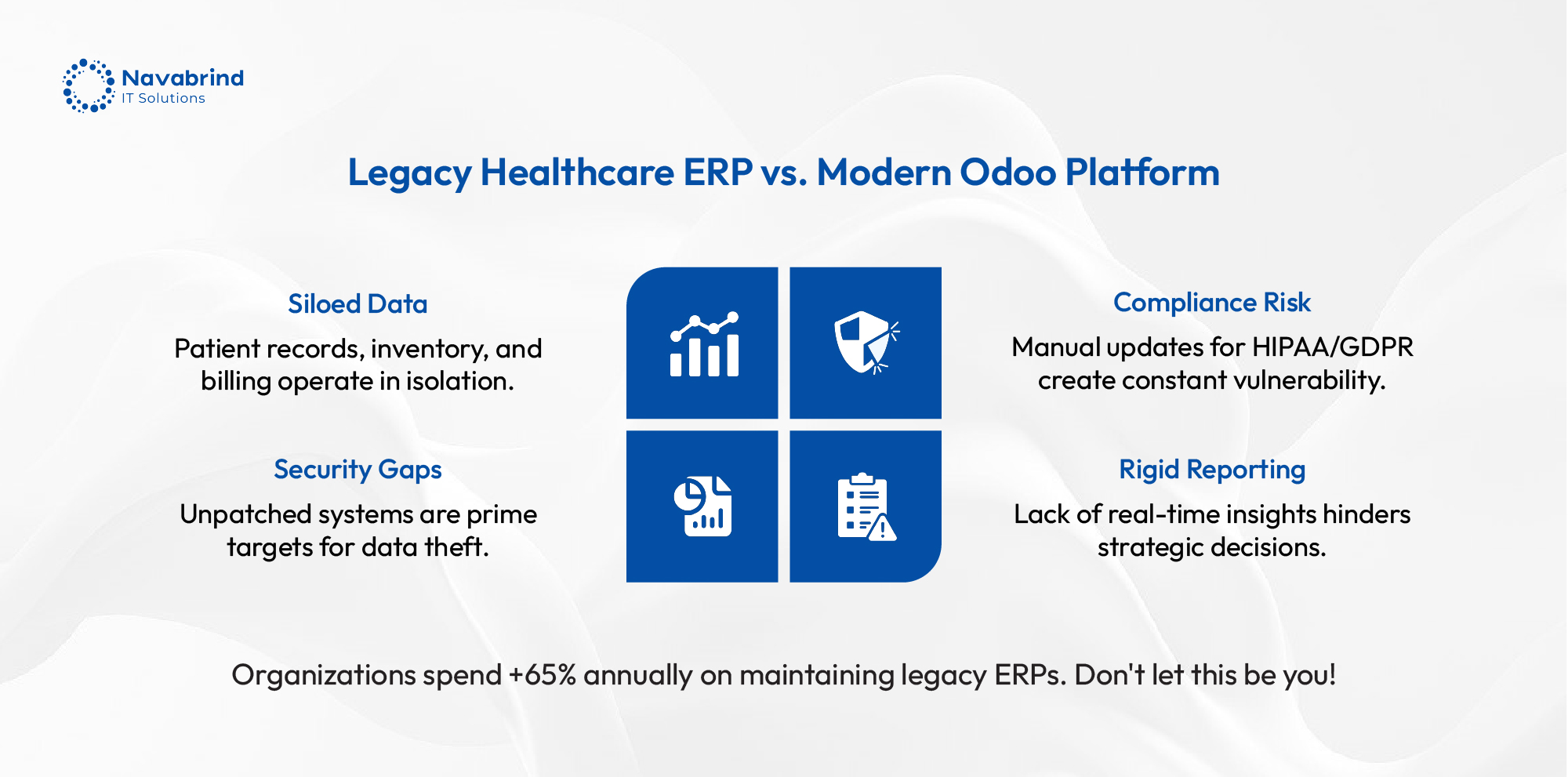Odoo ERP Omnichannel Manufacturing Solutions: Seamlessly Manage B2B and B2C Operations
- April 4, 2025
- Posted by: Tony
- Categories: Blog, Odoo, Odoo Manufacturing
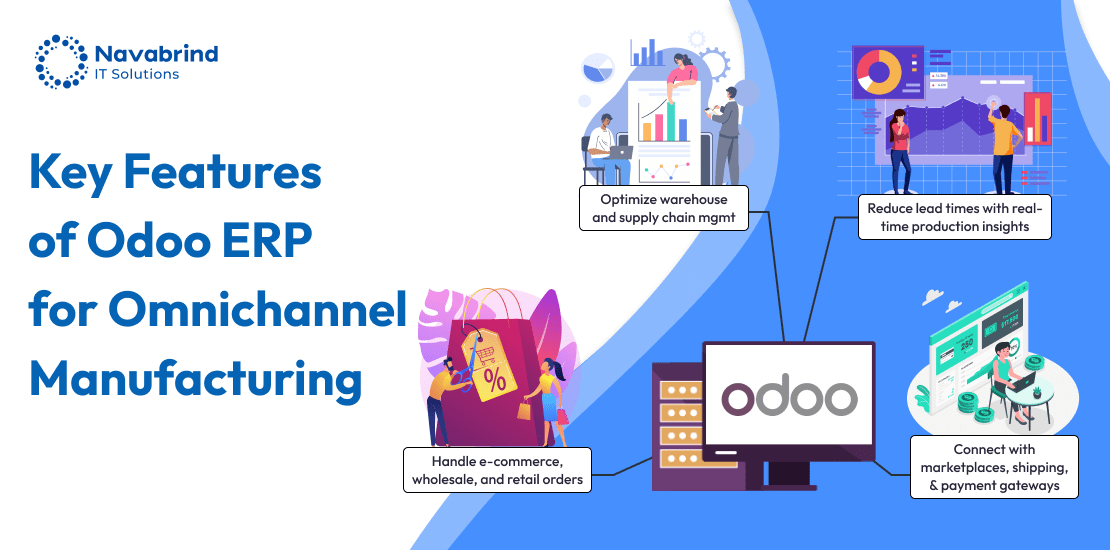
B2B and B2C manufacturers face unique challenges. B2B manufacturing focuses on bulk production and standard processes, while B2C operations need quick delivery times and custom products.Managing B2B and B2C operations without proper tools often leads to inventory problems, late deliveries, and lower profits.
Odoo ERP for manufacturing provides a solution to these challenges. This omnichannel manufacturing solution merges B2B and B2C operations into one unified system. The Odoo platform gives users the flexibility and control needed to handle different manufacturing requirements from production planning to order fulfillment.
Understanding Odoo ERP for Manufacturing Requirements
Modern production environments are shaped by omnichannel manufacturing solutions. Up-to-date data reveals that 87% of B2B suppliers think about omnichannel marketing as their top priority.
Common challenges in Odoo B2B, B2C operations
Manufacturers face several obstacles when running B2B and B2C operations. More than 57% of B2B buyers research online before making purchasing decisions. Companies must adapt their warehousing operations from bulk pallets to smaller, frequent orders.
B2B buyers now expect B2C-like experiences, and 70% of the digital buyer experience happens before they contact sales representatives. This transformation requires manufacturers to keep inventory data consistent across channels and provide instant updates to avoid overselling.
Role of Odoo ERP in omnichannel manufacturing
Omnichannel ERP systems are vital to unified operations. These systems ensure up-to-the-minute data analysis synchronization across channels, from online platforms to physical locations. To cite an instance, a customer’s online order triggers immediate inventory updates across all platforms.
The implementation of omnichannel strategies has produced impressive results. Omnichannel customers show 250% higher purchase frequency while making up only 7% of all customers. Manufacturers can process orders quickly from multiple sources through integrated order management. This ensures consistent fulfillment whatever the channel.
Core Modules of Odoo ERP for Manufacturing
Our research shows that successful omnichannel manufacturing solutions depend heavily on resilient ERP modules. Odoo ERP for manufacturing offers a robust solution to handle complex operational needs.
Manufacturing resource planning features
Odoo’s manufacturing module is great at streamlining production processes. The system comes packed with these key features:
- Multi-level Bill of Materials (BoM) management
- Automated material requirement planning
- Production scheduling optimization
- Resource allocation tools
- Up-to-the-minute production tracking
Odoo’s system stands out because it knows how to automate reordering processes. You’ll never run out of stock as it generates purchase orders based on predefined levels.
Inventory and warehouse management capabilities
Odoo’s inventory management system works as the backbone of omnichannel operations. Odoo ERP for manufacturing delivers instant updates on stock availability and helps businesses make smart decisions about inventory levels.
Key features include
- Stock tracking – Real-time inventory monitoring across locations
- Warehouse layout – Customizable storage management and picking processes
- Automation – Barcode integration and automated reordering
- Multi-location – Efficient stock management across different warehouses
Quality control and compliance tools
Odoo’s quality control features show impressive results in maintaining product integrity. The system lets businesses:
- Define quality control processes for incoming and outgoing products
- Set up quality control teams and checkpoints
- Generate quality alerts based on predefined criteria
- Track batch and serial numbers for complete product traceability
Odoo ERP for omnichannel automates compliance tasks, which reduces the risk of missing regulatory changes. Odoo’s centralized database combines all compliance-related documents and audit trails effectively. This integration creates smooth communication between departments and keeps consistent quality standards across all channels.
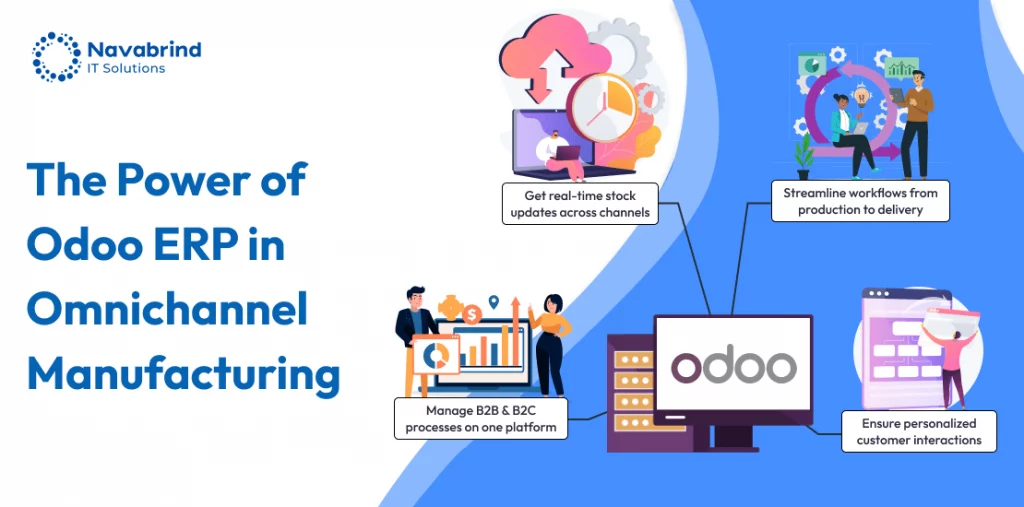
Managing B2B and B2C Channels with Odoo ERP
Odoo ERP for manufacturing blends B2B and B2C operations through its unified channel management system.
Setting up multiple sales channels
Odoo’s sales channel concept provides remarkable flexibility to manage different business segments. The Configuration menu lets users create distinct sales channels for both B2B and B2C operations. Each channel includes:
- Customizable email aliases for lead generation
- Dedicated pipeline structures
- Team-specific dashboards
- Integrated reporting capabilities
Configuring pricing and discount structures
Odoo’s pricing system helps manage B2B and B2C pricing strategies effectively. Here’s how we structure different pricing approaches:
| Customer Type | Pricing Features | Payment Terms |
| B2B | Volume-based pricing, Negotiated rates | Net-30/60/90 options |
| B2C | Fixed retail pricing, Promotional discounts | Immediate payment |
Odoo B2B B2C operations lets users set up separate price lists for each customer segment. This feature enables users to:
- Offer tax-included prices for B2C customers
- Display tax-excluded prices for B2B transactions
- Implement automatic price adjustments based on business relationships
Odoo - Best ERP for Omnichannel Manufacturing Operations
Production operations across multiple channels need sophisticated planning tools and execution strategies. Odoo’s advanced planning features optimize manufacturing processes in both B2B and B2C operations.
Demand forecasting across channels
Odoo’s demand forecasting capabilities analyze historical data with statistical algorithms to generate accurate predictions. The system uses several methods including:
|
Forecasting Method |
Best Used For |
|
Moving Average |
Short-term predictions |
|
Exponential Smoothing |
Seasonal trends |
|
Statistical Analysis |
Long-term planning |
With Odoo ERP for manufacturing, users reduce stockouts by up to 70% and minimize overstocking by 60%. Odoo’s shared forecasting feature lets multiple stakeholders add their insights, for more accurate predictions.
Production scheduling optimization
Odoo’s Master Production Schedule (MPS) coordinates manufacturing activities. The system provides:
- Automated scheduling based on demand patterns
- Immediate adjustments to production timelines
- Integration with inventory and procurement systems
With Odoo ERP for manufacturing, planners can adjust forecasting parameters to match specific business needs with Odoo’s scheduling tools. The system refines forecasts automatically based on past data, which removes the need for manual updates.
Real-time Data Management and Analytics for Omnichannel Manufacturing Solutions
Data drives Odoo ERP for manufacturing. Odoo ERP’s analytics capabilities turn raw information into applicable information. Manufacturing operations benefit from complete data management tools that give live visibility across all channels.
Unified reporting across channels
Odoo ERP for omnichannel makes reporting simpler by automatically integrating financial data across companies. This unified approach:
- Reduces manual data compilation inconsistencies
- Delivers live consolidated financial reports
- Enables customized reporting based on specific needs
Odoo ERP for manufacturing analyzes revenue streams and customer behavior across different channels to optimize profitability.
Performance metrics and KPIs
Managing B2B and B2C with Odoo ERP requires the set up of a strong KPI monitoring system that tracks significant metrics across our omnichannel operations. Our performance tracking structure includes:
|
KPI Category |
Metrics Tracked |
Business Impact |
|
Sales Performance |
Cross-channel conversion rates |
Operational efficiency increased by 30% |
|
Customer Behavior |
Purchase frequency |
250% higher for omnichannel customers |
|
Inventory Management |
Stock turnover rates |
Live stock visibility |
|
Production Efficiency |
Equipment utilization |
Proactive maintenance scheduling |
These metrics help us identify underperforming channels and growth opportunities. Our analysis shows that businesses using Odoo’s reporting tools experience better decision-making efficiency.
Capitalize on Odoo- Best ERP for Omnichannel Manufacturing Operations
Manufacturing success depends on smooth management of both B2B and B2C operations. Manufacturers who use Odoo’s integrated system see better inventory control and efficient production planning. Their decisions come from informed data analysis. B2B operations run smoother with automated bulk orders, while B2C channels excel through individual-specific fulfillment. These improvements work together, as shown by omnichannel customers who buy 250% more frequently.
The right tools create manufacturing excellence. Odoo ERP for manufacturing stands out by bringing operations together. It helps optimize resources and keeps quality consistent across channels. The system’s reliable analytics let manufacturers make smart choices based on immediate data. This leads to better operations and happier customers.
Frequently Asked Questions
1. How does Odoo ERP facilitate omnichannel management for manufacturers?
Odoo ERP Omnichannel enables manufacturers to manage operations across multiple sales channels with ease and efficiency. Here’s how Odoo ERP facilitates omnichannel management for manufacturers:
1. Unified Data Across Channels
Odoo ERP Omnichannel consolidatesdata from different sales channels—physical stores, online stores, and B2B platforms—into one centralized system. This eliminates data silos and ensures that inventory, orders, pricing, and customer information are consistent and up-to-date across touchpoints.
2. Real-Time Inventory Management
With Odoo ERP Omnichannel, manufacturers can track and manage inventory in real-time across all sales channels. Stock levels are updated automatically when orders are placed, preventing issues like overselling or stockouts.
3. Customer Relationship Management (CRM)
Odoo’s integrated CRM enables manufacturers to manage customer interactions across touchpoints, providing a unified view of customer data. By tracking customer behavior, preferences, and interactions across B2B and B2C channels, manufacturers can offer personalized services and improve communication.
4. Seamless Integration with E-Commerce and POS Systems
Odoo ERP omnichannel connects with various e-commerce platforms, POS systems, and marketplaces, ensuring seamless integration across channels. Data such as product information, inventory levels, and sales orders are automatically synchronized, providing a consistent experience for customers whether they are shopping online or in-store.
5. Comprehensive Analytics and Reporting
Odoo provides powerful reporting tools that give manufacturers insights into the performance of all their sales channels. With real-time analytics, manufacturers can track sales, monitor inventory, and evaluate customer behavior across B2B and B2C segments, allowing for data-driven decision-making and optimization of their omnichannel strategies.
2. What are the key features of Odoo ERP that benefit both B2B and B2C operations?
Odoo B2B B2C Operations provides an integrated solution that caters to the needs of B2B and B2C sales channels. Its robust features enable manufacturers to efficiently manage complex workflows and ensure coordination between the two customer segments. Here are some key features of Odoo ERP that benefit B2B and B2C operations:
- Customizable Pricing and Discount Rules: Odoo ERP allows manufacturers to set different pricing models, discounts, and payment terms for B2B and B2C customers. This customization ensures that pricing strategies are aligned with the expectations and requirements of each channel while maintaining consistency and control.
- Integrated Sales and Marketing Tools: Odoo’s integrated CRM and marketing modules provide businesses with tools to manage customer relationships across B2B and B2C segments. These tools allow manufacturers to personalize communication, manage leads, and launch targeted campaigns.
- Omnichannel Integration: Odoo’s integration with e-commerce platforms, marketplaces, and POS systems ensures a consistent experience across sales channels. Product information, pricing, and orders are synchronized in real-time, providing a unified view of operations.
- Advanced Analytics and Reporting: Odoo ERP provides powerful reporting capabilities, offering insights into sales, inventory, and customer data across both B2B and B2C channels. Manufacturers can analyze performance, identify trends, and make data-driven decisions to optimize operations.
- Production and Inventory Planning: Odoo B2B B2C Operations integrate sales data with production and inventory management, ensuring that demand from B2B and B2C channels is accurately reflected in production schedules.
3. How can Odoo ERP improve the efficiency of B2B and B2C operations in manufacturing?
Odoo B2B B2C Operations provides an integrated solution to optimize and streamline processes across these two channels. By unifying sales, inventory, production, and customer management in a single system, Odoo ERP improves efficiency and ensures consistency across B2B and B2C operations.
Key Ways Odoo Enhances B2B and B2C Efficiency:
- Real-Time Inventory: With Odoo B2B B2C Operations, manufacturers can track inventory in real-time, preventing stockouts or overstocking. This ensures product availability and optimizes stock replenishment processes.
- Customized Pricing and Discounts: B2B and B2C customers often have different pricing models and discount structures. Odoo ERP allows manufacturers to set custom pricing rules and discount schemes for each channel, ensuring accurate pricing and better control over margins.
- Efficient Production Planning: Odoo ERP integrates production schedules with real-time demand from B2B and B2C channels. This ensures that production is aligned with actual customer demand and reduces the risk of overproduction or underproduction.
- Integration with Sales Channels: Odoo ERP integrates with e-commerce platforms, POS systems, and marketplaces, ensuring consistent data across all B2B and B2C touchpoints. Whether it’s a bulk B2B order or a small B2C order, the system ensures synchronization.
- Advanced Analytics and Reporting: Odoo B2B B2C Operations provides powerful analytics tools to track the performance of B2B and B2C operations. Manufacturers can use these insights to optimize production, sales, and inventory strategies.
4. What are the advantages of using Odoo ERP for omnichannel manufacturing over traditional systems?
Odoo ERP Omnichannel offers significant advantages over traditional systems by providing a unified, integrated platform that streamlines operations, enhances data accuracy, and improves customer experiences across all channels.
Key Advantages:
- Unified Data Management: Traditional systems often require separate solutions for each channel, leading to fragmented data and inefficiencies. Odoo ERP Omnichannel consolidates all data—sales, inventory, production, and customer interactions—into a single system.
- Real-Time Inventory Tracking: Traditional systems may struggle with real-time synchronization of stock levels across multiple channels, leading to stockouts or overstocking. Odoo ERP Omnichannel provides real-time inventory management, ensuring that stock levels are automatically updated across B2B and B2C channels, preventing issues like double-selling or understocking.
- Improved Order Management: With Odoo, order data from various channels (e-commerce, physical stores, or wholesale) is automatically captured and processed. This integrated order management system reduces the complexity of managing multiple sales channels.
- Customizable and Scalable: Unlike traditional systems, which often require costly customizations or separate solutions for different operations, Odoo ERP Omnichannel is highly flexible.
Enhanced Customer Experience: Odoo ERP Omnichannel allows for consistent customer interactions across all touchpoints, whether it’s a B2B buyer placing a bulk order or a consumer shopping online. Integrated CRM and marketing tools enable businesses to track customer preferences and deliver personalized services, boosting loyalty and sales.
5. How does Odoo ERP handle real-time data synchronization between B2B and B2C channels?
With Odoo B2B B2C Operations, businesses benefit from a unified platform that ensures seamless real-time data synchronization between these distinct channels, driving efficiency and customer satisfaction.
Rather than relying on disconnected systems, Odoo creates a centralized database where inventory, orders, and customer data are continuously updated. For instance, when a B2B order is placed, stock levels are immediately adjusted and reflected in the B2C storefront, preventing overselling. Similarly, updates to pricing, product details, or promotional offers are applied across both channels in real time, ensuring consistency.
Odoo also streamlines workflows by integrating sales, inventory, and customer management systems. This integration allows businesses to manage bulk B2B orders alongside high-volume B2C transactions without duplication of effort or data discrepancies.
Moreover, advanced reporting tools in Odoo B2B B2C Operations provide actionable insights, enabling businesses to analyze channel-specific performance. This empowers companies to optimize pricing strategies, forecast demand more accurately, and maintain a balanced supply chain.
With Odoo ERP, businesses no longer face the challenges of siloed data or manual updates between B2B and B2C channels. Instead, they gain a robust system that ensures real-time data synchronization.
6. Can Odoo ERP be customized to meet specific needs for managing B2B and B2C operations in manufacturing?
Odoo ERP for manufacturing offers an integrated solution that streamlines omnichannel management, enabling manufacturers to efficiently manage their operations across multiple sales and distribution channels.
Key Ways Odoo ERP Enhances Omnichannel Management:
- Unified Order Management: Odoo ERP for manufacturing centralizes order processing from various channels, including e-commerce platforms, B2B portals, and brick-and-mortar stores. This eliminates the need for multiple systems.
- Real-Time Inventory Visibility: Manufacturers can track inventory levels in real time across all channels, ensuring accurate stock availability. This feature minimizes stockouts, prevents overstocking, and keeps operations aligned with demand fluctuations.
- Streamlined Production Planning: With consolidated order data, Odoo ERP enables manufacturers to adjust production schedules dynamically based on channel-specific demand.
- Integration with Sales Channels: Odoo integrates with e-commerce platforms, point-of-sale systems, and marketplaces, synchronizing data across all sales touchpoints. This integration ensures consistent pricing, product information, and order tracking.
- Enhanced Customer Service: By unifying customer data, Odoo ERP for manufacturing allows manufacturers to provide personalized service, quick responses, and proactive communication.
Omnichannel Analytics and Insights: Odoo’s robust analytics provide manufacturers with insights into channel performance, customer preferences, and demand trends.
Schedule a conversation with us now!
Related Articles
-
Post
How Odoo ERP Drives Efficiency in the Steel Industry
How Odoo ERP Drives Efficiency in the Steel Industry February 18, 2026 Posted by: Tony Categories: Blog, Odoo No Comments The High-Stakes Race of Auto Parts Manufacturing Your OEM demands a production schedule shift, but procurement can’t confirm steel availability. The sales team lacks real-time inventory data for a quote and your shop floor operates -
Post
Odoo Database Migration Guide: From Homegrown Retail ERP to Odoo ERP Without Downtime
Odoo Database Migration Guide: From Homegrown Retail ERP to Odoo ERP Without Downtime February 18, 2026 Posted by: Tony Category: Uncategorized No Comments The Need for Smooth Odoo Database Migration If your outdated software, disparate applications, and an unsupported ERP begin to hinder work, you are no longer dealing with a minor technical issue, but -
Post
From Legacy Healthcare ERP to Odoo ERP: Why You Need Expert Odoo Migration Help
From Legacy Healthcare ERP to Odoo ERP: Why You Need Expert Odoo Migration Help February 11, 2026 Posted by: Tony Category: Uncategorized No Comments Why Healthcare Organizations Need Odoo ERP Migration Legacy healthcare ERP systems create barriers to efficiency. They are expensive to maintain, and struggle to integrate tools. This disconnect impacts patient care coordination,
How can we help you?
Get in touch with a solutions consultant that can share best practices and help solve specific challenges.







